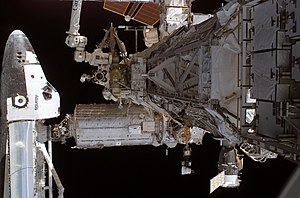The Economist has dedicated an issue to the “end of the space age” suggesting over three articles that the promise of the space race has faded, political will eroded, and public interest evaporated. Who can blame them? Aging isn’t easy! Like life, it always seems more exciting when you’re young and free and visionary.
Kennedy mesmerized the world with sheer audacity of launching the space race. Without a doubt the excitement led to incredible achievements built on competition and daring goals. It helped, of course, that this competition had political objectives and seemingly unlimited resources to back it up.
When the shuttle program took off, it galvanized the world, again, around the possibilities of new technologies and intrepid journeys. The shuttles made it possible to create and support the International Space Station with which the shuttle has docked for that last time. I know I was captivated by the possibilities the ISS provided that unfortunately never materialized for most of the American (and global) public. Indeed, The Economist got it right that, over thirty years, the space program has become commonplace, mundane—just another trip to the International Space Station. But, where the The Economist sees the mundane Mach 30 appreciates the mature.
There’s less fanfare in building the foundations, but Mach 30 is focused on a new audacious goal—Open Source Spaceflight Hardware; cooperation that moves beyond government agendas or private industry to a community-led effort. Shuttle technology never focused sufficiently on building the mature technologies that could be leveraged for missions further afield. Imagine what small steps over 30 years might have meant to a spacefaring future.
Mature technologies (perhaps with small changes or new uses) are the foundation of successful systems. It’s critical that those systems be sustainable also in order to make long-term space travel a reality. Mach 30 goes one step further by placing open source as a central springboard for innovation to keep barriers low and advancement rapid among communities of practice—reaching for the stars through community.
Mach 30 accepts that moving a little slower but very deliberately may actually be the quickest route—even admitting we do miss some of the excitement of the race! That is maturity indeed.
And, yet there are dreams to be achieved. There are bold goals yet to be named. Find them with us—whether you’re a space enthusiast or simply recall shuttle memories—by joining Mach 30’s community. Donate. Friend us. Contribute to Open Design Engineering. With an open community leveraging mature technologies for sustainable travel spacefaring will be a reality.



